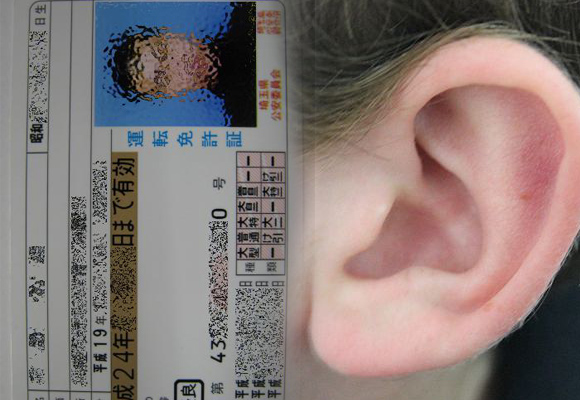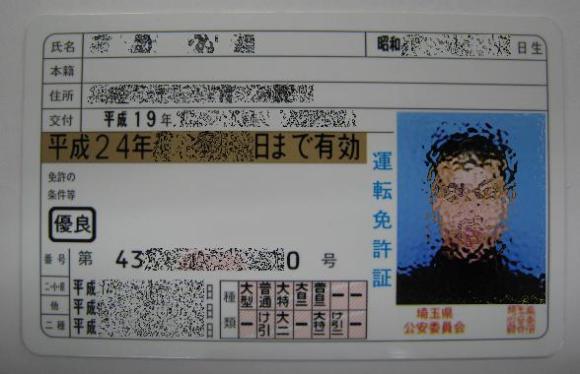
In the middle of this month, 41-year-old Kazunori Terashima must have felt some sense of satisfaction as his bankbook showed a transfer of 350 yen (US$3.33) from the Saitama Public Safety Commission. After struggling against the police for two and a half years over an improper traffic stop he had finally won his inalienable right to clean his ear in traffic.
■ The Ticket
In May of 2010, Terashima was driving his car with his elbow resting on the seat’s arm rest and hand busy cleaning his ear. Reports hadn’t confirmed whether he was using a tool or simply his finger.
Suddenly, a police officer came out from behind the large sign of a glasses shop on the side of the road. They blew a whistle and held out a red flag to pull over Terashima’s car. He could see what they must have thought he was doing and immediately told them when they approached the car, “I wasn’t using a phone.”
“Show me your license,” the officer said ignoring him.
Terashima tried to rationalize with the police officer saying “Please, just look at the phone’s history…” but they did not.
The conversation (or lack thereof) devolved into a 20-minute argument which resulted in the officer yelling, “If you don’t show me your license, I’ll have you arrested.” Terashima then reluctantly gave in and showed the license, but refused to sign the ticket they tried to issue him.
■ The Trial
In October of the same year, Terashima had to get his driver’s license renewed. During the process he learned that he had gotten a demerit point from his ear cleaning incident a few months back.
In Japan, driver’s licenses have a color coding system in which a gold (perfect) license means you have a record free of accidents and violations. So with this demerit, Terashima’s license was demoted to a blue (general) one, which can have implications on his insurance premiums and how often he has to renew. In addition he must attend a lengthy traffic safety lecture for which he must pay a small fee.
In the following year he decided to sue. His argument was simple: “Why didn’t they check the mobile phone records? I want policing to be objective and fair…”
Over nine trial hearings that lasted until March of this year, the court finally ruled in favor of Terashima. They said that “the credibility of the officer’s investigation report and statement was poor.” Saitama Prefecture had appealed but it was rejected.
When all was said and done, Terashima now has his 350 yen that he paid for the traffic safety lecture. However, he had never received any type of apology from the police or prefecture over the incident and presumably still carries a blue license. Online reaction was somewhat mixed with many accusing the police of abusing their power while some others had felt cleaning one’s ears while driving wasn’t responsible driving either.
Regardless of whoever was right in this situation, we still recommend that everyone refrain from cleaning their ears in their cars. Please do it on public transportation such as trains or buses instead. You’ll be surrounded by witnesses and will always have the seats next to you open for your belongings.
Source: Tokyo Web via Hachima Kiko (Japanese)
Images: Wikipedia (1,2)


 69-year-old Tokyo man arrested for driving without a license for over 50 years
69-year-old Tokyo man arrested for driving without a license for over 50 years Man rides motorbike into lobby of Fukuoka police station, demands they crack down on rude driving
Man rides motorbike into lobby of Fukuoka police station, demands they crack down on rude driving Over 2,000 Saitama residents to get refunds from the police for “erroneously” issued tickets
Over 2,000 Saitama residents to get refunds from the police for “erroneously” issued tickets Ritzy Japanese cop breaks Rolex wristwatch during arrest, sends suspect US$6,000 repair bill
Ritzy Japanese cop breaks Rolex wristwatch during arrest, sends suspect US$6,000 repair bill We examine the footage, decide Coming of Age Day in Okinawa is actually pretty badass【Video】
We examine the footage, decide Coming of Age Day in Okinawa is actually pretty badass【Video】 Japan’s new difficult-to-drink-from beer glass protects your liver, but it’s a brutal experience
Japan’s new difficult-to-drink-from beer glass protects your liver, but it’s a brutal experience Demon Slayer: Kimetsu no Yaiba gets new roller coaster attractions and food at Universal Studios Japan
Demon Slayer: Kimetsu no Yaiba gets new roller coaster attractions and food at Universal Studios Japan Come play hide-and-seek on a deserted Japanese island this August and November
Come play hide-and-seek on a deserted Japanese island this August and November New Pokémon ice cream, dessert drinks, and cool merch coming to Baskin-Robbins Japan【Pics】
New Pokémon ice cream, dessert drinks, and cool merch coming to Baskin-Robbins Japan【Pics】 Infographic shows how working culture differs across the globe
Infographic shows how working culture differs across the globe New Nintendo Lego kit is a beautiful piece of moving pixel art of Mario and Yoshi【Photos】
New Nintendo Lego kit is a beautiful piece of moving pixel art of Mario and Yoshi【Photos】 Real Buddhist monk plays Super Mario Bros., recites prayers every time he kills an enemy【Video】
Real Buddhist monk plays Super Mario Bros., recites prayers every time he kills an enemy【Video】 We check out the local flavors of the commonly confused Ome and Aomi areas of Tokyo in one day
We check out the local flavors of the commonly confused Ome and Aomi areas of Tokyo in one day Restaurant Yoshibei is crazy in the best way: A pork cutlet set with a side of pork cutlet bowl
Restaurant Yoshibei is crazy in the best way: A pork cutlet set with a side of pork cutlet bowl W.T.F. Japan: Top 5 craziest Japanese certification exams 【Weird Top Five】
W.T.F. Japan: Top 5 craziest Japanese certification exams 【Weird Top Five】 Nintendo history you can feel – Super NES, N64, and GameCube controllers become capsule toys
Nintendo history you can feel – Super NES, N64, and GameCube controllers become capsule toys Hello, cosmetics! Clinique teams up with Hello Kitty this summer for first-time collaboration
Hello, cosmetics! Clinique teams up with Hello Kitty this summer for first-time collaboration “The most Delicious Cup Noodle in history” – Japan’s French Cup Noodle wins our heart【Taste test】
“The most Delicious Cup Noodle in history” – Japan’s French Cup Noodle wins our heart【Taste test】 Starbucks releases a cute Frappuccino and Unicorn Cake…but not in Japan
Starbucks releases a cute Frappuccino and Unicorn Cake…but not in Japan Kyoto Tower mascot termination reveals dark side behind cute Japanese characters
Kyoto Tower mascot termination reveals dark side behind cute Japanese characters McDonald’s Japan’s Soft Twist Tower: A phantom ice cream only sold at select branches
McDonald’s Japan’s Soft Twist Tower: A phantom ice cream only sold at select branches Yabai Ramen: What makes this Japanese ramen so dangerous?
Yabai Ramen: What makes this Japanese ramen so dangerous? Finally! Nintendo Japan expands Switch 8-bit controller sales to everybody, Online member or not
Finally! Nintendo Japan expands Switch 8-bit controller sales to everybody, Online member or not Japanese government wants to build luxury resorts in all national parks for foreign tourists
Japanese government wants to build luxury resorts in all national parks for foreign tourists To combat declining birth rate, Japan to begin offering “Breeding Visas” to foreigners
To combat declining birth rate, Japan to begin offering “Breeding Visas” to foreigners 10 things you should buy at 7-Eleven in Japan
10 things you should buy at 7-Eleven in Japan Studio Ghibli releases anime heroine cosplay dresses that are super comfy to wear
Studio Ghibli releases anime heroine cosplay dresses that are super comfy to wear Woman charged for driving suitcase without a license in Osaka
Woman charged for driving suitcase without a license in Osaka Studio Ghibli unveils My Neighbour Totoro miniature house model
Studio Ghibli unveils My Neighbour Totoro miniature house model Kyoto experiencing problems with foreign tourists not paying for bus fares, but not on purpose
Kyoto experiencing problems with foreign tourists not paying for bus fares, but not on purpose Fighting mild hunger with a Japanese soda that turns into jelly in the stomach【Taste test】
Fighting mild hunger with a Japanese soda that turns into jelly in the stomach【Taste test】 Studio Ghibli’s Howl’s Moving Castle tapestry unveiled in Japan for first time
Studio Ghibli’s Howl’s Moving Castle tapestry unveiled in Japan for first time McDonald’s new Happy Meals offer up cute and practical Sanrio lifestyle goods
McDonald’s new Happy Meals offer up cute and practical Sanrio lifestyle goods Sales of Japan’s most convenient train ticket/shopping payment cards suspended indefinitely
Sales of Japan’s most convenient train ticket/shopping payment cards suspended indefinitely Sold-out Studio Ghibli desktop humidifiers are back so Totoro can help you through the dry season
Sold-out Studio Ghibli desktop humidifiers are back so Totoro can help you through the dry season Japanese government to make first change to romanization spelling rules since the 1950s
Japanese government to make first change to romanization spelling rules since the 1950s Foreigner’s request for help in Tokyo makes us sad for the state of society
Foreigner’s request for help in Tokyo makes us sad for the state of society Ghibli founders Toshio Suzuki and Hayao Miyazaki contribute to Japanese whisky Totoro label design
Ghibli founders Toshio Suzuki and Hayao Miyazaki contribute to Japanese whisky Totoro label design Doraemon found buried at sea as scene from 1993 anime becomes real life【Photos】
Doraemon found buried at sea as scene from 1993 anime becomes real life【Photos】 Tokyo’s most famous Starbucks is closed
Tokyo’s most famous Starbucks is closed Princesses, fruits, and blacksmiths: Study reveals the 30 most unusual family names in Japan
Princesses, fruits, and blacksmiths: Study reveals the 30 most unusual family names in Japan Aichi Police: Surrender your driver’s license and get up to $1 off at McDonald’s!
Aichi Police: Surrender your driver’s license and get up to $1 off at McDonald’s! Aichi Police refund over a million yen in fines to drivers who violated a misplaced traffic sign
Aichi Police refund over a million yen in fines to drivers who violated a misplaced traffic sign Man released on drug charges because police wouldn’t let him use the toilet
Man released on drug charges because police wouldn’t let him use the toilet New traffic safety collaboration with Crocodile Who Dies in 100 Days sends mixed messages
New traffic safety collaboration with Crocodile Who Dies in 100 Days sends mixed messages Japanese police officer pursues, pulls over Lamborghini supercar…while on a bicycle【Video】
Japanese police officer pursues, pulls over Lamborghini supercar…while on a bicycle【Video】 Gifu police chase shoplifter with 20 patrol cars and helicopter, fail to catch him
Gifu police chase shoplifter with 20 patrol cars and helicopter, fail to catch him Real fashion police: Con man arrested in Tokyo, police tipped off by ill-fitting suit
Real fashion police: Con man arrested in Tokyo, police tipped off by ill-fitting suit Kyoto accidentally calls all old people “terrible drivers”【Why Does Engrish Happen in Japan?】
Kyoto accidentally calls all old people “terrible drivers”【Why Does Engrish Happen in Japan?】 Elderly motorists in Japan given option to “graduate from driving” to prevent accidents
Elderly motorists in Japan given option to “graduate from driving” to prevent accidents Japanese high schooler fails driver’s license test 20 times, tries to hire someone else to take it for him
Japanese high schooler fails driver’s license test 20 times, tries to hire someone else to take it for him Final Fantasy X is becoming a kabuki play with actor with anime-to-stage experience
Final Fantasy X is becoming a kabuki play with actor with anime-to-stage experience Shinkansen driver disciplined for taking poop break while train was going 150 kilometers an hour
Shinkansen driver disciplined for taking poop break while train was going 150 kilometers an hour Segways soon to be permitted on public roads and new rules in the works for electric scooters
Segways soon to be permitted on public roads and new rules in the works for electric scooters Japanese police question man for “not looking good in a suit,” turns out he robbed an old lady
Japanese police question man for “not looking good in a suit,” turns out he robbed an old lady Saitama lieutenant calls subordinate’s lunch “garbage”, then loses job for eating garbage lunches
Saitama lieutenant calls subordinate’s lunch “garbage”, then loses job for eating garbage lunches City in Nagano offers super cheap taxi fares to seniors who give up licenses and disabled people
City in Nagano offers super cheap taxi fares to seniors who give up licenses and disabled people
Leave a Reply